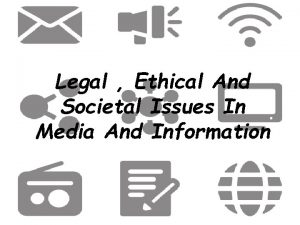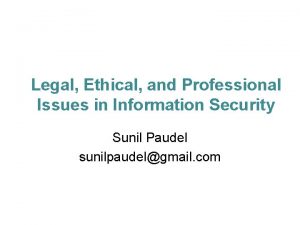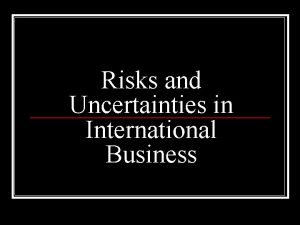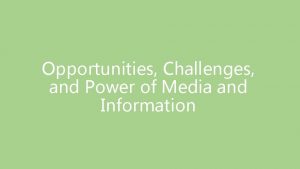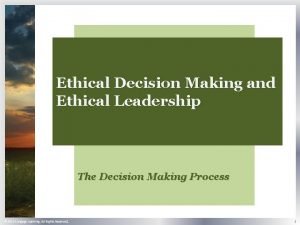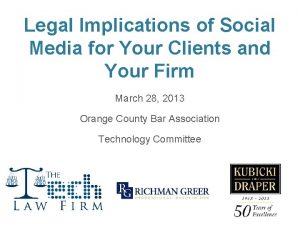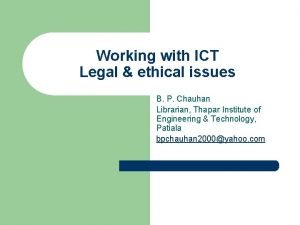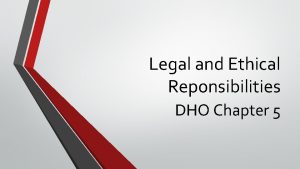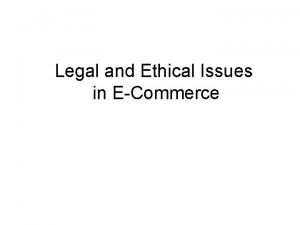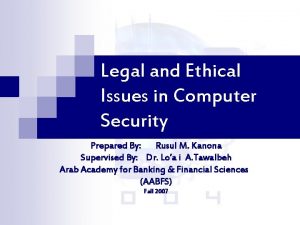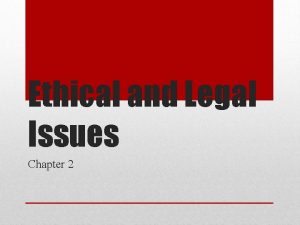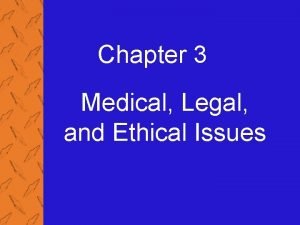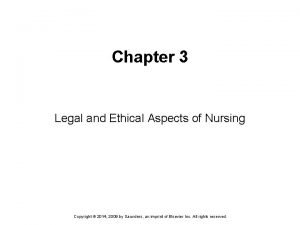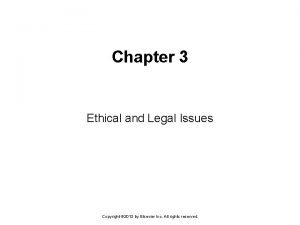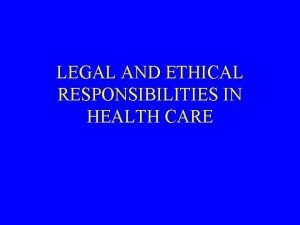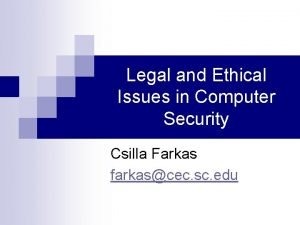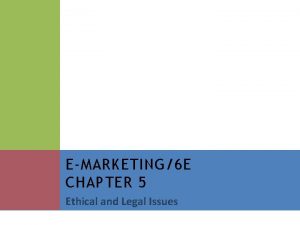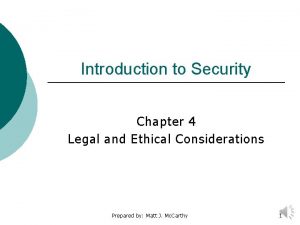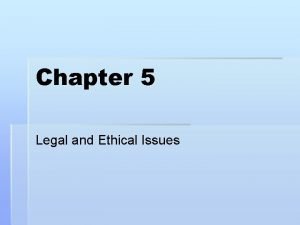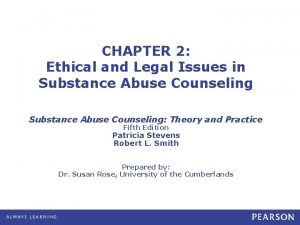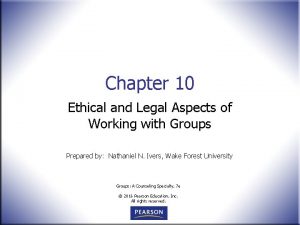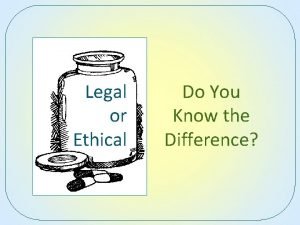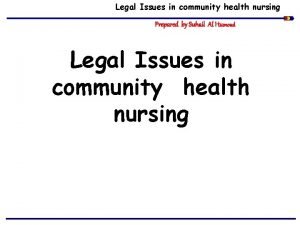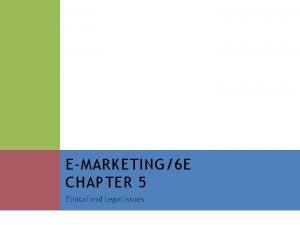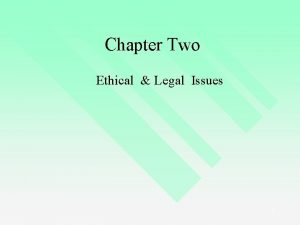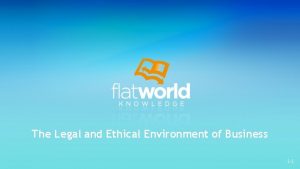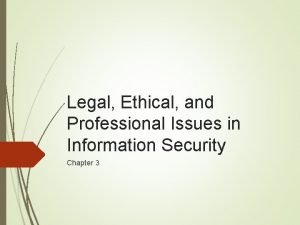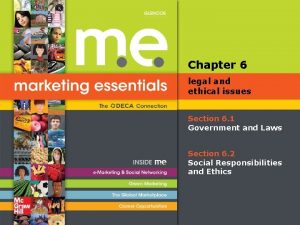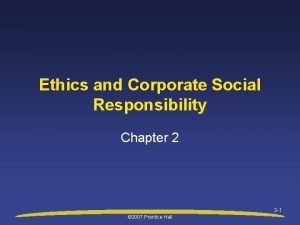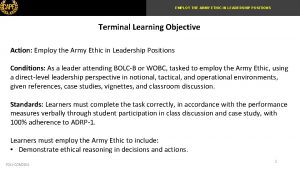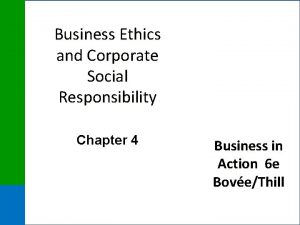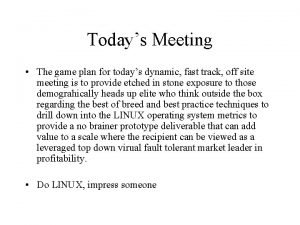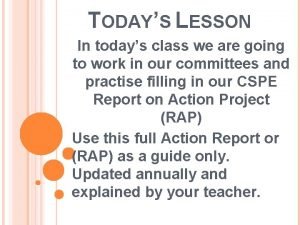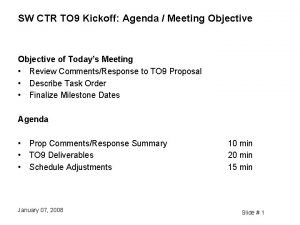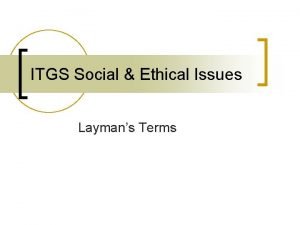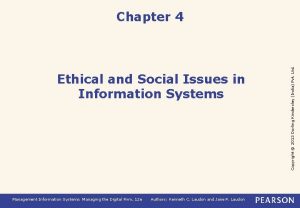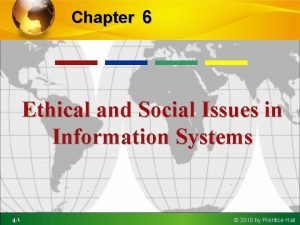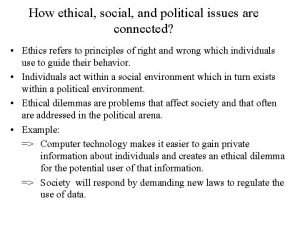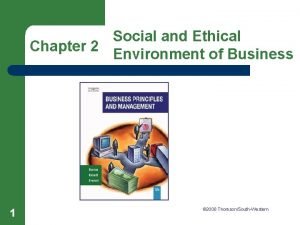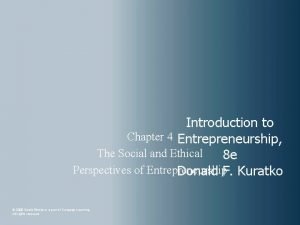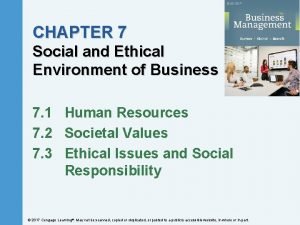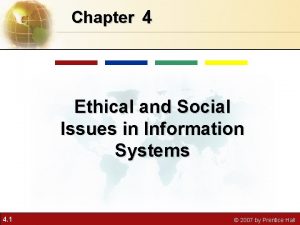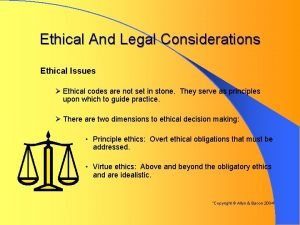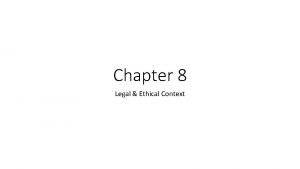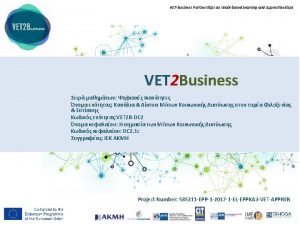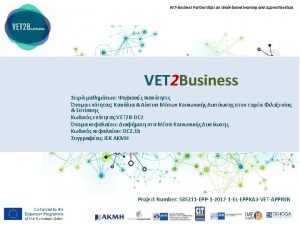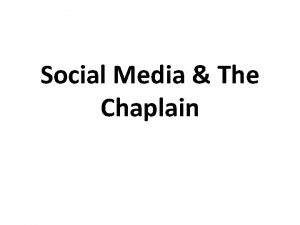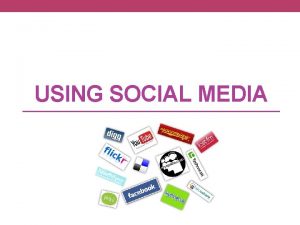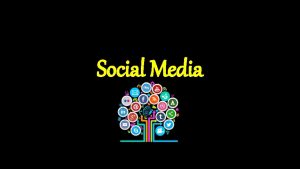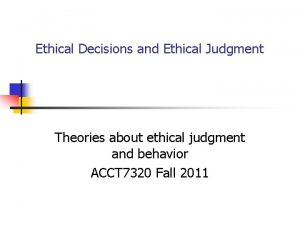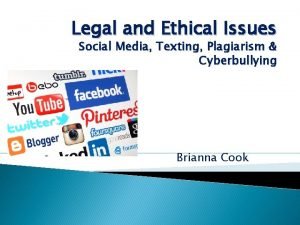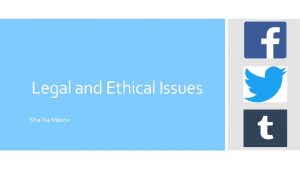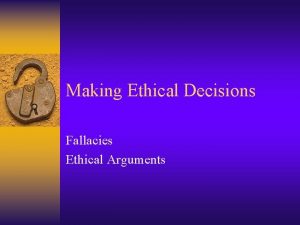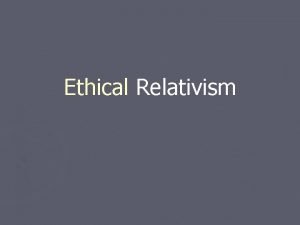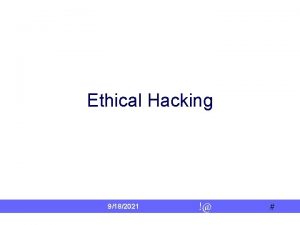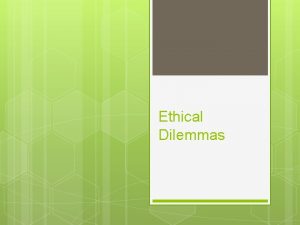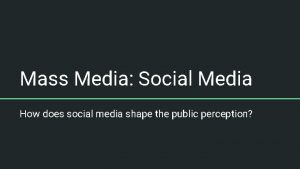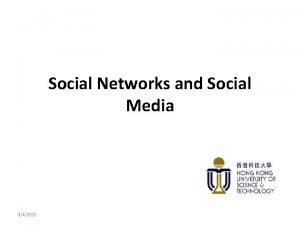Social Media Today The Legal Ethical Risks and

























































- Slides: 57

Social Media Today! The Legal & Ethical Risks and Requirements for Employers and Managers Willow Misty Parks Anderson School of Management University of New Mexico Albuquerque, NM © 2014 The Business Bookshelf, LLC & Willow Misty Parks

IMPORTANT NOTICE • General Legal Information; NOT Legal Advice • This presentation is NOT legal advice or legal representation. • This presentation sets out general concepts and some of the basics regarding social networking. • Anyone determining that they need legal advice or representation should seek counsel from an attorney or law firm.

Significance of Social Media to Business • Important to businesses! • Violations of others’rights can be costly, even if done by an employee of the company • What every employer and manager should know – Understanding the basics – Key challenges and risk factors for employers – How to address potential abuse or misuse – Prepare to design legal and effective Social Media Policies in the workplace

Significance of Social Media to Business • A 2012 report by Silk. Road Technology revealed that 75 percent of employees access social media daily on the job, with 60 percent doing it multiple times per day. • Almost half the respondents indicated that connecting with co-workers was the top reason to use social media at work. • Only 23 percent of the employees, however, had received a social media policy from their employers, and fewer than 10 percent had received social media training.

Significance of Social Media to Business • Social media in the workplace • There are only 48. 3% of companies that allow their employees access to social networking that doesn’t involve business. • 26. 7% of companies allow a selected group of employees to have access to social networking, and only a quarter of all companies ban social networking. • Companies have implemented policies for the use of social networking. This is to keep employees from talking about company business. Some employees do not realize they say anything wrong when talking about their jobs online.

Current Issues • Whether businesses block, monitor, or have policies on social media use in the workplace • Some companies have blocked certain social media websites – 1. It could alienate younger employees. – 2. It suggests mistrust. – 3. It shows lack of support.

Current Issues • Two main benefits of social media: enhanced communication and advanced methods of collaboration. • Companies are taking into consideration implementing their own internal social media, such as Microsoft’s Share Point to encourage team collaboration. • Some 46% of global information workers say using social tools has increased their productivity.

Current Issues Why Your Company Needs a Social Media Policy • 67% of online adults are now using at least some form of social networking

What is “Social Media”? • Social media is defined as: – …media for social interaction, using highly accessible and scalable communication techniques. – …the use of web-based and mobile technologies to turn communication into interactive dialogue.

What is “Social Media”? • • My. Space Facebook Friendster Linked. In Twitter Skype Texting Whats. App • Blogs • Digg, Reddit, Technorati • You. Tube • Unvarnished • Instant Messaging • Snapchat • Line

Social Media in the News • Do Your Social Media Policies Run Afoul of the First Amendment? • Social Media Sparks Policy Debate • Employer Access to Social Media Usernames and Passwords • Even if It Enrages Your Boss, Social Net Speech Is Protected

How Employees Use Social Media • Job search • Communication—with other employees, clients, vendors, customers • Researching products, services, employers • Spreading the word about a product or service • Criticizing the job, the boss, or co-workers

Benefits to Business of Social Networking • Building business relationships and rapport • Employee engagement – Allow employees to communicate with consumers over social networks – Internal social networks like Yammer can help employees to communicate with each other

Benefits of Social Media • Employees use social media as a way to relieve stress during a break and to rejuvenate, which increases productivity. • Now employers are faced with new challenges regarding the laws and policies surrounding social media in the workplace. • These issues seem to be unclear in many companies. Putting a policy into place to protect the employer as well as the employee is fundamental with the increasing changes in the workplace.

Social NOT-working? • How many working hours are lost? Ø 50% of Facebook users log on every day • 22% visit social networking sites 5+ times/week Ø Only 52% of employees say they don’t use social networking sites during work hours Ø And that’s not counting time spent texting, instant messaging, surfing, making phone calls, etc. …

Beneficial or Social NOT-working? • A recent study conducted by Evolv shows hourly employees who use social media are actually more productive than their non-social counterparts. • And this productivity goes up with the more social networks an employee frequents.

Beneficial or Social NOT- working? • A wholesale block of social media might actually be harmful to talent attraction • A 2012 survey found two out of five Gen Y workers rate social media access above receiving a higher salary.

Employees’ Views of Social Media • Survey says: Ø 53% of employees say their social networking pages are none of their employers’ business Ø 74% say it’s easy to damage a company’s reputation on social media Ø 15% say that if their employer did something that they didn’t agree with, they would comment about it online

Online Outlets for Disgruntled Employees www. workrant. com www. fthisjob. com www. rantasaurus-rex. com

Employers’ Views of Social Media • 40% of business executives surveyed disagree that what employees put on their social networking pages is not the employer’s business • 30% admit to informally monitoring social networking sites

Information That Can Be Found on Social Networking Sites • • • Education Hobbies Vacation Photos Birthdates and age Religion Links to profiles of friends • Health and disability history • • Work history Favorite music Party photos Links to blogs Career interests Family information Political views Favorite movies

Social Media and Key Legal Risks for Employers Ø Negligent hiring/supervision Ø Discrimination/harassment/retaliation Ø Disclosure of trade secrets or proprietary information Ø Reputational harm to employees Ø Reputational harm to employers Ø Monitoring and privacy issues Ø Legal constraints on employee discipline regarding social media use

Risks for Employers • Using the Web to Make Hiring Decisions – Many employers and job recruiters check out potential employees on the Web • Using search engines such as Google or Yahoo, and internet sites such as People. Finders. com, Local. Live. com, or Zillow. com – Some studies show more than half of employers use some kind of screening on social networking sites

Risk Factor: Employee Use Risk Factor: Discrimination, Harassment and Retaliation – Employee Use of Social Media – Electronic communications offer opportunities for misuse – Can be used as evidence to support a harassment or discrimination claim

Risk Factor: Negligent Hiring, Supervision, Retention An employer may be held liable for an employee’s wrongful acts if the employer knew or had reason to know of the risk the employment created • Doe v. XYC Corp. , N. J. Super. 122 (2005) – Employee was criminally charged with child pornography using a workplace computer – Court held employer had a duty to investigate and respond

Risk Factor: Discrimination, Harassment, Retaliation – Employer Use of Social Media Info • Social networking sites, blogs, etc. , may contain information about an applicant’s – Age – Race – National origin – Disabilities – Sexual orientation – Religion, etc. • Difficult to prove employer did not rely on this information once known • Is it the truth? – Information may be inaccurate or outdated

Risk Factor: Discrimination, Harassment and Retaliation – Employee Use of Social Media • Electronic communications offer opportunities for misuse • Can be used as evidence to support a harassment or discrimination claim • Blakely v. Continental Airlines, Inc. , 164 N. J. 38 (2000) – Alleged harassment via “Crew Member Forum” – Company has duty to take effective measure to stop the conduct once it knew or should have known harassment was taking place

Risk Factor: Reputational Harm to Employees Ø Defamation – plaintiff must prove defendant published a false statement about plaintiff that tends to harm plaintiff’s reputation Ø Employer can be liable if the employee had apparent authority to speak on its behalf – Beware of personal references!!

Risk Factor: Reputational Harm to Employers • Employees posting videos and photographs damaging to company’s image – Domino’s, Burger King, KFC • Former employee slamming company’s system with disparaging e-mails – 200, 000 e-mails sent to 35, 000 Intel employees complaining about former employee’s treatment by Intel • Former employees “cyber-smearing” employer – Result: $775, 000 compensatory and punitive damages award against former employees

Defamation v. Non-Disparagement • Non-disparagement clauses are customarily used in settlement agreements and severance contracts in the employment law context. • The temptation can be irresistible for disgruntled former employees to trash their former employer on social media sites like Facebook, Twitter, or Linked. In, on blogs, by text or e-mail, or other electronic means.

Risk Factor: Reputational Harm to Employers • FTC GUIDELINES ØGuides make clear that employees who use social media to post comments regarding company products or services without disclosing the employment relationship might create liability for their employers. ØPotential liability may exist even if the comments were not sponsored or authorized by the employer.

Risk Factor: Business Proprietary Information • Intellectual Property Infringement Ø Microsoft employee posted software upgrade • Securities fraud/unfair competition Ø Whole Foods CEO’s anonymous blogging criticizing competitors led to unfair competition lawsuit and FTC/SEC investigation

Risk Factor: Employee Monitoring and Privacy • Public sector employees – Fourth Amendment in the U. S. Constitution • Private sector employees – tort claims

Risk Factor: Employee Monitoring and Privacy • Key question: Did the employee have a reasonable expectation of privacy in the electronic communication? • Ensure monitoring is: • based on legitimate needs, and • limited in scope to achieve those needs • Attorney-Client Privileged Information

Risk Factor: Employee Monitoring and Privacy Ø Courts are more likely to rule for the employer if: o Employer owns the computer and e-mail system o Employee voluntarily uses an employer’s network o Employee has consented to be monitored (usually based in written personnel policy)

Risk Factor: Employee Monitoring and Privacy Ø Currently unclear if an employee has a reasonable expectation of privacy in blogs or IMs Ø Courts have split on whethere is a reasonable expectation of privacy in content maintained on thirdparty servers (e. g. , web-based e-mail accounts)

Risk Factor: Employee Monitoring and Privacy Issues City of Ontario, CA v. Quon, No. 08 -1332 (U. S. Supreme Court), Decided June 17, 2010 • Issue: Did city police officer have an expectation of privacy in personal text messages sent via a cityissued pager? • Officer paid for extended service so he could send messages while off duty • Sued after police chief read messages in which officer was sexting his girlfriend and wife

Risk Factor: Federal Wiretap Act Ø Prohibits “interception” of electronic communications Ø Question of who is an “authorized user? ”

Risk Factor: Federal Stored Communications Act Prevents employers from using illicit or coercive means to access employees’ private electronic communications Quon v. Arch Wireless Operating Co. , 554 F. 3 d 769 (9 th Cir. 2008) • Arch Wireless violated SCA by disclosing text messages without consent • Cert Denied by Supreme Court 39

Risk Factor: Legal Constraints on Employee Discipline • National Labor Relations Act Ø Protected Concerted Activity o Employees have a right to engage in "concerted activity“ for the purpose of collective bargaining or other mutual aid or protection o Applies to both union and non-union employees o What is “Protected Concerted Activity? ” o 1) whether the communication is related to an ongoing labor dispute o (2) whether it is “so disloyal, reckless or maliciously untrue” as to lose the Act’s protection.

Risk Factor: Legal Constraints on Employee Discipline Ø National Labor Relations Act Ø Protected Concerted Activity Ø Register-Guard, 352 NLRB 1110 (2007) – that the employer discriminatorily applied its Communication Systems Policy (CSP) and violated Sections 8(a)(1) and (3) of the National Labor Relations Act when it disciplined an employee for using the company’s email system to disseminate union-related solicitations because the employer permitted other employees to circulate personal solicitations Ø LESSON: Have a No Solicitation policy, and make sure it is applied across the board to all types of communications.

Risk Factor: Legal Constraints on Employee Discipline NLRB v. American Medical Response of Connecticut (AMR)

Risk Factor: Legal Constraints on Employee Discipline Ø National Labor Relations Act Ø Unlawful Surveillance o The Board compared an employer’s monitoring of employee social networks to eavesdropping on employees’ discussions with their union representative in a break room. In Magna Int’l, Inc. , 2001 NLRB LEXIS 134 (March 9, 2001)

Risk Factor: Legal Constraints on Employee Discipline Ø Expression of political opinions Ø Legal off-duty activities Ø Wrongful termination in violation of public policy (arrests, convictions, bankruptcy, workers’ compensation history) Ø Whistleblowing (SOX, Wage & Hour)

RISK FACTOR: Do Not Request Passwords • Multiple states have passed laws or are actively considering legislation limiting the rights of employers to request or require employees to provide social media site user ID, passwords, or data. • CA, IL, MA, and MI all have laws barring employers from seeking social media passwords from applicants. • NM and UT also just passed similar laws.

What should an employer do?

Employee Discipline v. Legal Constraints Stop and Think, then…. o Investigation Is Key o Decipher How Federal and State Law Play Into the Equation

Methods to Minimize Risk • Employers Should: Ø Maintain regular oversight of your own network Ø Develop a clear Electronic Communications Policy - Get a signed acknowledgment of the policy Ø Set limits Ø Clarify expectations of privacy Ø Do not prohibit employees from discussing terms and conditions of employment

Employee Policy: What To Include? Ø Employees must abide by non-disclosure and confidentiality policies and agreements Ø Do not create blanket and broad social media policies against "disrespectful comments" or critical posts on social media. Ø Employees may not make defamatory or harassing comments when discussing the employer, co-workers, products, services, and/or competitors

Employee Policy: What To Include? Ø 4 Tips For A Better Social Media Policy ØGive Specific Examples ØImplement a Social Media Training Program ØEmpower Employees to Become Brand Ambassadors ØTrust Employee Judgment

Employee Policy: What To Include? • No expectation of privacy when using company equipment o The Company owns the rights to all data and files in any computer, network, or other information system used in the Company. o The Company also reserves the right to monitor electronic mail messages (including personal/private/instant messaging systems) and their content, as well as any and all use by employees of the Internet and of computer equipment used to create, view, or access e-mail and Internet content. o The Company uses software in its electronic information systems that allows monitoring by authorized personnel and that creates and stores copies of any messages, files, or other information that is entered into, received by, sent, or viewed on such systems. Accordingly, employees should assume that whatever they do, type, enter, send, receive, and view on Company electronic information systems is electronically stored and subject to inspection, monitoring, evaluation, and Company use at any time.

Employee Policy: What To Include? Ø Only individuals officially designated may speak on behalf of the Company Ø “Bloggers Beware” – Require a disclaimer: “The views expressed in this blog are my personal views and opinions and do not necessarily represent the views or opinions of my employer. ” 52

Employee Policy: What To Include? Ø Direct: What is considered an “Acceptable Use” o Business use only o Limited personal use o Unlimited personal use Ø A reporting procedure for violations of the policy

EMPLOYERS SHOULD FOLLOW THE POLICY CONSISTENTLY!!!!!

Social Media and the Rules of Evidence Ø Is it Discoverable? o Emotional Trauma and Harassment Ø Can it be Helpful?

Non-exclusive License Permission is granted under a non-exclusive license to copy and distribute this work to the Daniel’s Foundation for purposes of education and classroom instruction. Permission is specifically denied for commercial use, creation of derivatives, or otherwise for financial gain without specific written permission from the author. No other entity or organization is given permission to copy, distribute, make derivatives, display or otherwise use. You are welcome to preprint any of my articles/presentations with the following conditions: 1. Include all Copyright Notices and Cautions 2. Articles/Power. Points must be used in their entirety. Excerpts are acceptable pending permission. 3. If you are using an article online, all the copyright notices must be included. 4. Email distribution of this article must be to an opt-in email list only. NO SPAM! Once you reprint or use an article/presentation, a courtesy copy of your publication or description of the use would be appreciated: Willow Misty Parks PO Box 25312 Albuquerque, NM 87125 willowmistyparks@gmail. com Willow Misty Parks, Owner of the Business Bookshelf, LLC

© 2014 The Business Bookshelf, LLC & Willow Misty Parks Copyrights and all rights are reserved in aspects that are original and fixed by the author, and to compilation, organization and arrangement under the US Copyright Act, except where the copyrights are owned by another, are under GNU licenses, or do not have copyright as in Public Domain and Federal Government works. Some works may be used under the legal principle of Fair Use and the author makes no representations of ownership to works that are currently owned or protected under the Copyright Laws and therefore gives no consent to any further uses including but not limited to reproductions, display, distribution by any other parties. The author takes no responsibility and will not be liable for any unauthorized uses by others that may lead to violations of the Copyright Act.
 The writer properly quotes and cited sources in some places
The writer properly quotes and cited sources in some places Professional issues ethics and computer law
Professional issues ethics and computer law Types of risk in international business
Types of risk in international business Opportunities about media and information
Opportunities about media and information Ethical habits
Ethical habits Legal implications of social media
Legal implications of social media Legal and ethical issues in use of ict
Legal and ethical issues in use of ict Dho chapter 5 legal and ethical responsibilities
Dho chapter 5 legal and ethical responsibilities Legal and ethical issues in ecommerce
Legal and ethical issues in ecommerce Legal and ethical issues in computer security
Legal and ethical issues in computer security Ethical and legal issues involved in practicum
Ethical and legal issues involved in practicum Ethical and legal issues chapter 2
Ethical and legal issues chapter 2 Medical legal and ethical issues chapter 3
Medical legal and ethical issues chapter 3 Nflpn code of ethics
Nflpn code of ethics Chapter 3 ethical and legal issues
Chapter 3 ethical and legal issues Chapter 5 legal and ethical issues
Chapter 5 legal and ethical issues Ethical and legal responsibilities of healthcare workers
Ethical and legal responsibilities of healthcare workers Ethical issues in computer security
Ethical issues in computer security Legal and ethical issues chapter 5
Legal and ethical issues chapter 5 Medical legal and ethical issues chapter 3
Medical legal and ethical issues chapter 3 Chapter 4 legal and ethical responsibilities
Chapter 4 legal and ethical responsibilities Legal and ethical responsibilities of a coach
Legal and ethical responsibilities of a coach Chapter 6 legal and ethical issues
Chapter 6 legal and ethical issues Legal and ethical issues chapter 5
Legal and ethical issues chapter 5 Ethical and legal issues chapter 2
Ethical and legal issues chapter 2 Chapter 2 ethical and legal issues
Chapter 2 ethical and legal issues Chapter 5 legal and ethical responsibilities worksheet
Chapter 5 legal and ethical responsibilities worksheet Ethical and legal issues affecting the nursing assistant
Ethical and legal issues affecting the nursing assistant What is the difference between ethical and legal issues
What is the difference between ethical and legal issues Legal issues in community health nursing
Legal issues in community health nursing Legal and ethical principles in healthcare
Legal and ethical principles in healthcare Legal and ethical issues chapter 5
Legal and ethical issues chapter 5 Chapter 2 ethical and legal issues
Chapter 2 ethical and legal issues The legal and ethical environment of business
The legal and ethical environment of business Legal and ethical issues in information security
Legal and ethical issues in information security Legal issues in psychiatric nursing
Legal issues in psychiatric nursing Beneficence
Beneficence Chapter 6 legal and ethical issues
Chapter 6 legal and ethical issues Chapter 6 legal and ethical issues
Chapter 6 legal and ethical issues Chapter 3 legal and ethical issues
Chapter 3 legal and ethical issues Perbedaan ethical dilemma dan ethical lapse
Perbedaan ethical dilemma dan ethical lapse Ethical lenses army
Ethical lenses army Csr and business ethics
Csr and business ethics For today's meeting
For today's meeting Today's class was amazing
Today's class was amazing Meeting objective
Meeting objective Fingerprint galton details
Fingerprint galton details Today's lesson or today lesson
Today's lesson or today lesson Example of repitition
Example of repitition How do you understand the term “people media”?
How do you understand the term “people media”? Itgs social and ethical issues
Itgs social and ethical issues Ethical and social issues in information systems doc
Ethical and social issues in information systems doc Ethical and social issues in information systems doc
Ethical and social issues in information systems doc How ethical social and political issues are connected
How ethical social and political issues are connected Chapter 2 social and ethical environment of business
Chapter 2 social and ethical environment of business The social and ethical perspectives of entrepreneurship
The social and ethical perspectives of entrepreneurship Chapter 7 social and ethical environment of business
Chapter 7 social and ethical environment of business Chapter 4 ethical issues
Chapter 4 ethical issues
